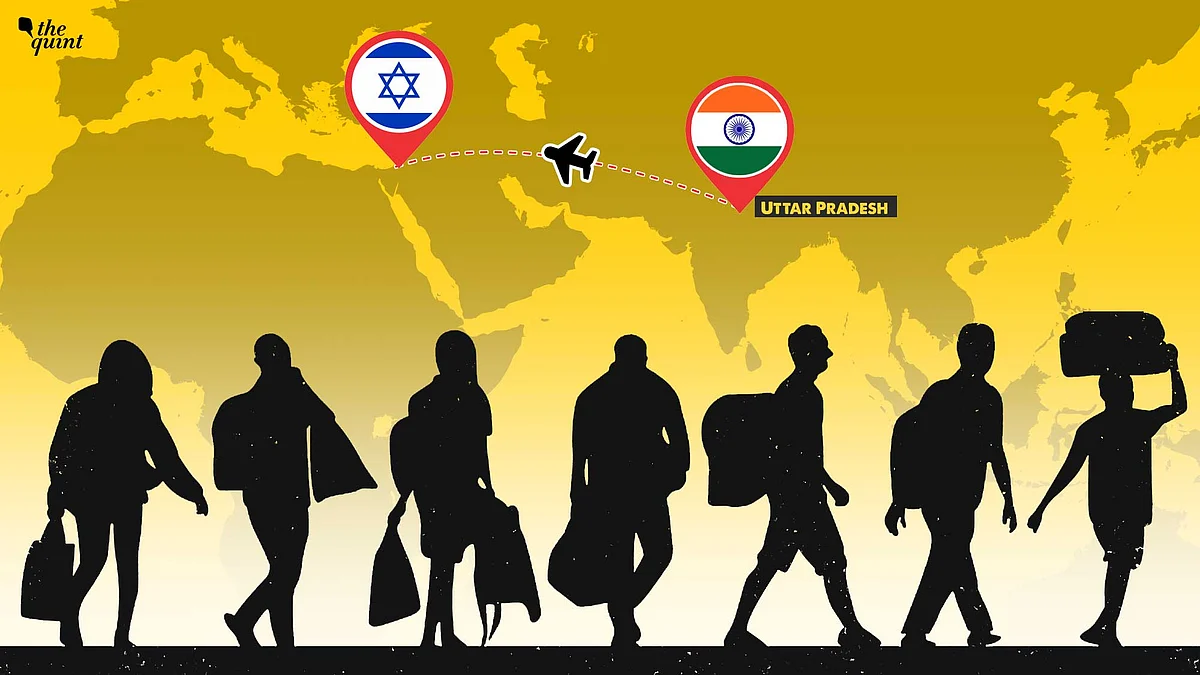Dear UP CM, Your State's Youth Immigrate to Israel Out of Necessity, Not Choice
Yogi Adityanath's boastful speech on youth from UP taking up skilled jobs in Israel requires a closer look.

advertisement
When Congress leader Priyanka Gandhi carried a bag to Parliament emblazoned with the name and symbols of Palestine, it ignited more than just visual curiosity — it sparked a biting reaction from Uttar Pradesh Chief Minister Yogi Adityanath. Mocking her gesture, he boasted about sending 5,600 youth from his state to work on projects in Israel.
Interestingly, while delivering an animated speech in the state Assembly, Adityanath emphasised that the youth from Uttar Pradesh going to Israel are taking up skilled jobs, receiving free food and accommodation, and sending back Rs 1.5 lakh each month. He also proudly claimed that these remittances are fuelling the state's development.
Israel Remains a Highly Volatile Country
According to a document presented in the Parliament on 12 December, there are currently 32,000 Indians working in Israel. Notably, 12,000 of them migrated after October 2023, when the Hamas-Israel conflict erupted, resulting in over 45,000 Palestinian deaths so far. Khaled Khiari, the Assistant Secretary-General for the Middle East, Asia, and the Pacific in the United Nations Departments of Political and Peacebuilding Affairs and Peace Operations, said on Wednesday that a ceasefire is "long overdue."
In other words, the region remains highly volatile. Yet, it is here that our youth, including 5,600 from Uttar Pradesh, are working under dangerous conditions, risking their lives. Should Adityanath feel proud about this? No. The testimonies I collected from UP youth standing in the queue for a recruitment drive revealed that many had chosen to migrate out of necessity rather than by choice.
He told me that before he could start working in Israel, he was required to pay the equivalent of $1,000 to "the Indian company" that recruited him, in addition to covering the cost of airfare from India to Israel, as outlined in the documents all applicants were required to sign.
In short, his migration was driven by necessity, not choice. Moreover, the recruitment was not free either.
How the Recruitment Drive Was Carried Out
In May 2023, India and Israel signed an agreement to send over 40,000 Indian workers to Israel. At that time, neither country anticipated that a war between Israel and Hamas, based in Gaza, would erupt just a few months later in October. Despite the outbreak of war, the Indian government honoured the deal. On 19 December 2023, Israeli Prime Minister Benjamin Netanyahu even called Prime Minister Narendra Modi to expedite the arrival of Indian workers. In early 2024, the National Skill Development Corporation (NSDC) launched a recruitment drive in Haryana and Uttar Pradesh.
Interestingly, the majority of available jobs were in the construction sector, and there was a specific reason for this. After the Hamas attack, the Israeli government stopped hiring Palestinian workers. As a result, Indian workers began replacing Palestinians in these positions.
The NSDC is a public-private partnership company, created in 2008 under India's Ministry of Finance and the Ministry of Skill Development and Entrepreneurship. The Indian government holds 49 percent of the company's shares, while private firms hold 51 percent. According to the NSDC's 'About Us' section, the organisation's mission is to promote skill development by catalysing the creation of large, quality, for-profit vocational institutions. Interestingly, recruitment is not mentioned in the 'About Us' section.
Launched in 2014, eMigrate aims to protect Indian workers abroad by mandating insurance and ensuring monitoring by Indian embassies and consulates in labour destination countries. Workers migrating through the eMigrate system are required to subscribe to the Pravasi Bharatiya Bhima Yojana, a mandatory insurance scheme that provides coverage of Rs 10 lakh in case of accidental death or permanent disability. The insurance premiums are Rs 275 for a two-year period and Rs 375 for a three-year period.
This scheme is compulsory for workers in various professions under Section 2(o) of the Emigration Act, 1983, regardless of their passport category. Interestingly, workers recruited to Israel must also subscribe to the Pravasi Bharatiya Bhima Yojana. However, as recruitment to Israel through the NSDC is not conducted via eMigrate, these workers are not eligible for the scheme or other benefits.
Enrolment in eMigrate is mandatory only for workers heading to countries on the Emigration Check Required (ECR) list, which includes nations with security risks or problematic labour laws. The 17 ECR countries are Afghanistan, Iraq, Jordan, Libya, Syria, Lebanon, Bahrain, Saudi Arabia, Kuwait, UAE, Oman, Qatar, Sudan, Yemen, Indonesia, Thailand, and Malaysia. While Afghanistan, Iraq, Libya, Syria, and Yemen are considered high-security risk areas, Saudi Arabia, Kuwait, UAE, Oman, Qatar, Sudan, Indonesia, Thailand, and Malaysia are primarily criticised for having unfavourable labour laws.
The Indian government data show that 135,882 youth from UP migrated for work to the above listed 17 countries in 2024. Out of that, 74,174 UP youth had migrated to Saudi Arabia.
(Rejimon Kuttappan is an independent journalist, forced labour investigator and author of the book Undocumented: Stories Of Indian Migrants: Stories of Indian Migrants in the Arab Gulf. This is an opinion piece and the views expressed are the author’s own. The Quint neither endorses nor is responsible for them.)